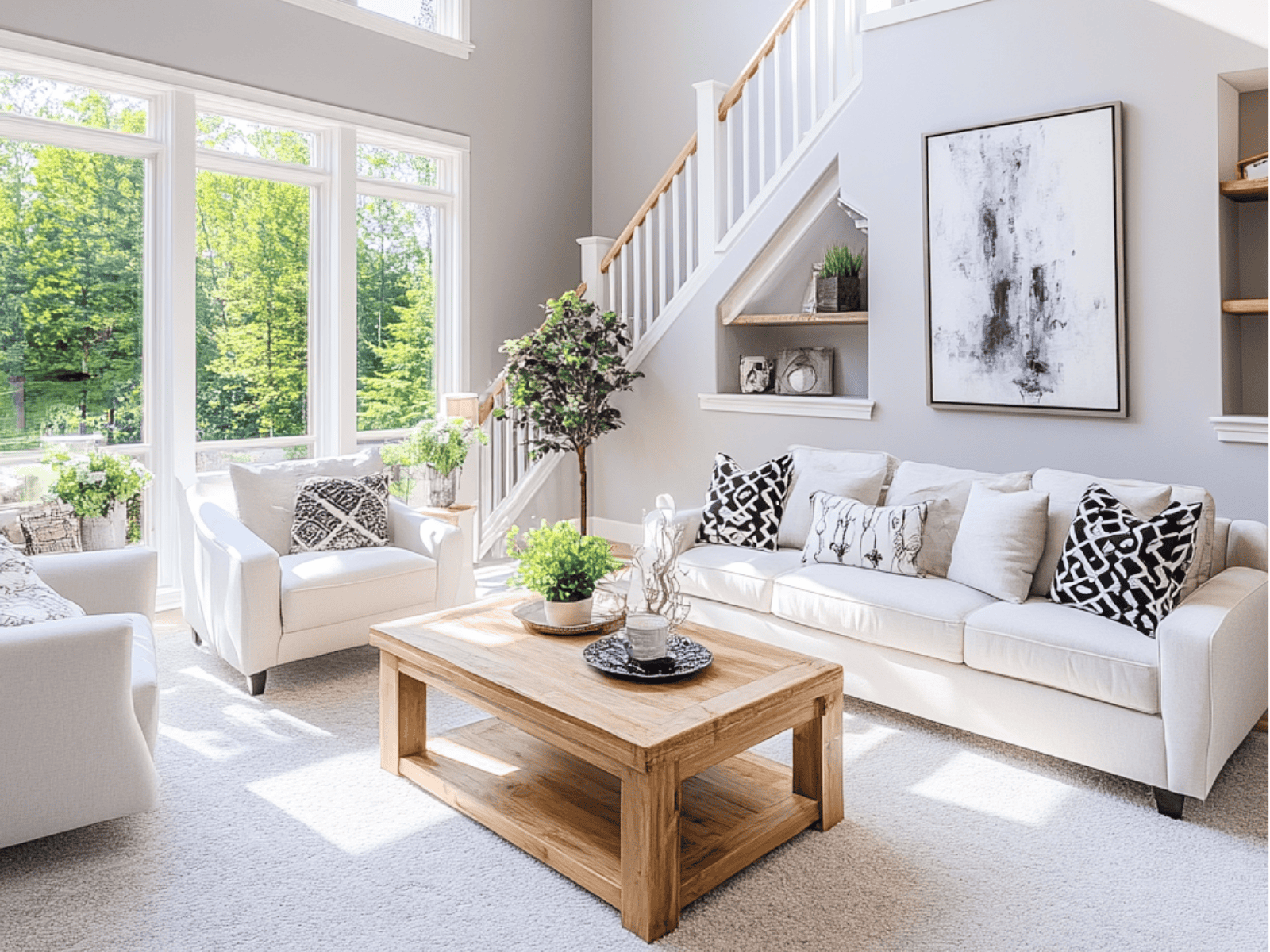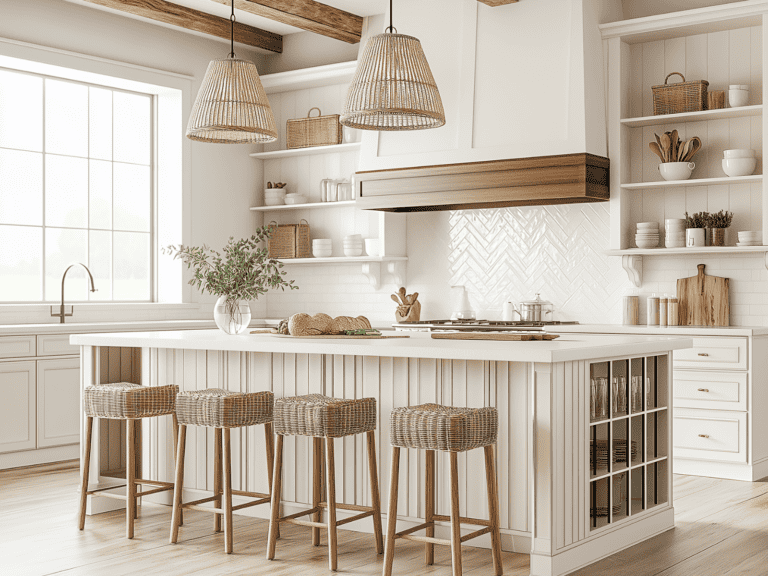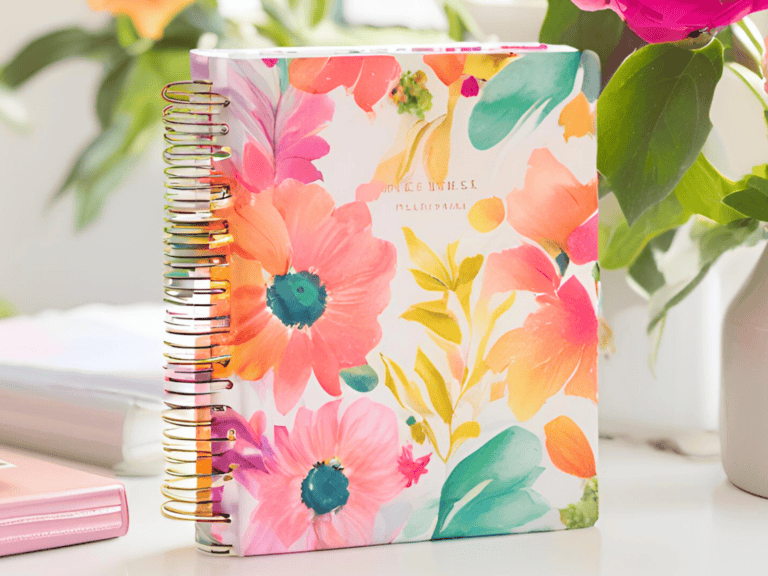20 Daily Decluttering Habits to Maintain a Clutter-Free Home
As someone who has successfully maintained a clutter-free home for years, I can attest to the power of daily decluttering habits. My journey from living in a chaotic, cluttered space to enjoying a serene, organized home wasn’t an overnight transformation. It was the result of implementing and consistently following 20 simple yet effective daily habits.
These habits have become second nature, seamlessly integrated into my daily routine. They’ve kept my living spaces tidy, reduced my stress levels, increased my productivity, and improved my overall quality of life. In this article, I’ll share these 20 daily decluttering habits that have been game-changers in maintaining my clutter-free home.
Whether you’re just starting your decluttering journey or looking to maintain your already organized space, these habits will help you create lasting change. They’re designed to be manageable and easy to incorporate into your daily life, no matter how busy you are. Let’s dive into the 20 daily decluttering habits that will transform your home and your life.
20 Daily Decluttering Habits to Maintain a Clutter-Free Home
As a home organizing expert, I’ve discovered that the key to a consistently tidy home lies in small, daily actions. These 20 habits have transformed my living space, and can do the same for you. Let’s dive into the daily habits that will lead you to a clutter-free home.
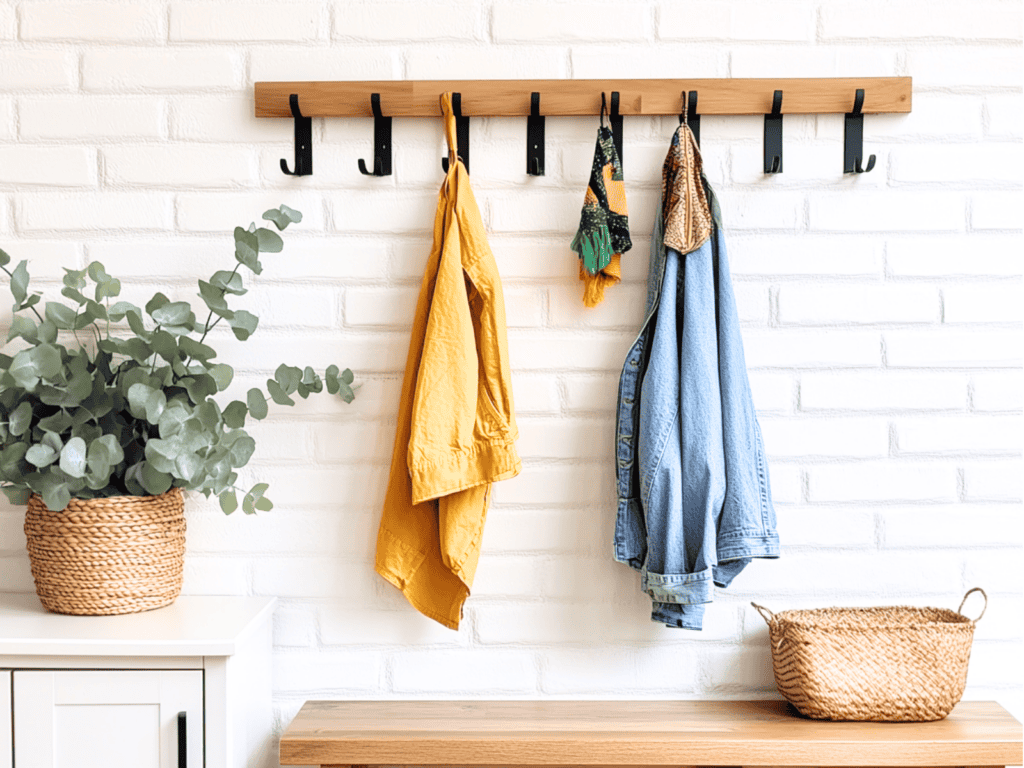
1. The One-Minute Rule
This simple rule is a game-changer. If a task takes less than a minute, do it immediately. Hang up your coat when you come home. File that document right away. Put the book back on the shelf after reading. These quick actions prevent small tasks from piling up into overwhelming clutter.
2. Make Your Bed Every Morning
Start your day with a win. As soon as you get up, make your bed. Straighten the sheets, fluff the pillows, and smooth the comforter. This simple act sets a productive tone for the day and instantly makes your bedroom look tidier.
3. Clear to Zero
Before bed, clear all flat surfaces to zero. This means countertops, tables, and desks should be completely clear. Put away all items or find proper homes for them. You’ll wake up to clear surfaces, reducing visual clutter and morning stress.
4. One In, One Out Rule
Maintain balance in your home. For every new item that comes in, remove one. Bought a new shirt? Donate an old one. New book? Time to pass on one you’ve finished. This habit maintains equilibrium in your belongings and prevents accumulation.
5. Daily Laundry Habit
Tackle laundry daily to prevent it from becoming overwhelming. Do one load from start to finish every day. Wash, dry, fold, and put away. This habit keeps your clothing manageable and your laundry area clutter-free.
6. Five-Minute Kitchen Reset
After each meal, spend five minutes resetting your kitchen. Wipe down counters, put away ingredients, and load the dishwasher. This quick reset maintains a clean kitchen and prevents dishes from piling up.
7. Nightly 10-Minute Tidy
Set a timer for 10 minutes each night and tidy as much as possible. Focus on high-traffic areas like the living room and entryway. This nightly reset prevents clutter from accumulating and helps you start each day fresh.
8. Designate a Donation Station
Keep a box or bag in a closet for items to donate. As you come across things you no longer need, add them to this station. This habit makes it easy to continually declutter and simplifies the donation process.
9. Process Mail Daily
Deal with mail as soon as it enters your home. Recycle junk mail immediately. File important documents. Act on time-sensitive items right away. This habit prevents paper clutter and ensures you don’t miss important deadlines.
10. Digital Declutter Session
Don’t forget about digital clutter. Spend 5 minutes daily decluttering your digital spaces. Delete unnecessary emails, organize computer files, and clear your desktop. This habit maintains digital organization, improving productivity and reducing stress.
11. Evening Closet Check
End your day with a quick closet check. Before bed, ensure all clothes are hung up or in the laundry basket. Hang up worn clothes that are still clean. Put dirty clothes in the hamper. This simple habit keeps your bedroom tidy and makes getting dressed easier in the morning.
12. One-Touch Rule
Adopt the one-touch rule when tidying. Handle each item only once. Instead of moving clutter from one spot to another, immediately put items in their proper place. This rule increases your efficiency and prevents the endless reshuffling of clutter.
13. Mindful Purchasing
Before buying anything, pause and reflect. Ask yourself if you truly need the item. Visualize where it will live in your home. This mindful approach reduces impulse buys and prevents unnecessary items from cluttering your space.
14. Clear Your Workspace
Clear and organize your desk or workspace at the end of each workday. File papers, put away supplies, and prepare for the next day. A tidy workspace improves focus and productivity while reducing work-related stress at home.
15. Nightly Bathroom Wipe-Down
Dedicate a few minutes each night to quickly wiping down bathroom surfaces: the sink, counter, and toilet. Hang up towels neatly. This nightly habit maintains a clean bathroom and prevents the build-up of toiletries and cosmetics.
16. Fridge Check Before Grocery Shopping
Before heading to the store, check your fridge and pantry. Make a list based on what you actually need, not what you think you might need. This habit reduces food waste and prevents cluttered, overstocked kitchen storage.
17. Five-Item Pick-Up
Implement the five-item rule. Every time you leave a room, take five items that don’t belong and return them to their proper places. Make it a game or challenge for yourself and your family members. This habit continuously moves items back to where they belong, preventing clutter build-up.
18. Daily Vacuum or Sweep
Quickly vacuum or sweep high-traffic areas daily, focusing on entryways, kitchens, and living areas. This simple habit maintains a clean appearance and prevents dirt and dust from accumulating.
19. Mindful Media Consumption
Regularly declutter your digital life. Unsubscribe from email lists and unfollow social media accounts that don’t add value. Set aside a few minutes daily to evaluate and streamline your digital inputs. This habit reduces digital clutter and information overload.
20. Evening Reflection and Planning
End your day with a few minutes of reflection and planning. Jot down areas that need attention and set small, achievable decluttering goals for the next day. This habit keeps you motivated and focused on maintaining your clutter-free home.
Incorporating these 20 daily habits into your routine will transform your home. Start with one or two habits and gradually add more as they become second nature. Remember, a clutter-free home is a journey, not a destination. Be patient with yourself and celebrate small victories along the way.
Benefits of Maintaining These 20 Daily Habits
Adopting these 20 daily decluttering habits doesn’t just lead to a tidier home. It transforms your entire life. Let me share the profound benefits I’ve experienced since implementing these habits.

Reduced Stress and Anxiety
A clutter-free environment has a significant impact on mental health. When your surroundings are organized, your mind feels calmer. You’re no longer constantly reminded of unfinished tasks or overwhelmed by visual chaos.
This link between clutter and stress is backed by scientific research. A study conducted by UCLA’s Center on Everyday Lives and Families (CELF) found that “women who perceived their homes as cluttered or needing work tended to have increased depressed mood and chronic stress” (Saxbe & Repetti, 2010). By decluttering your space, you’re not just improving your home’s appearance; you’re actively reducing your stress levels and boosting your mental well-being.
Personally, I’ve noticed a dramatic reduction in my stress levels. Coming home to a tidy space allows me to relax fully. I no longer feel the nagging anxiety of knowing a mess awaits me. This improved mental state has positively affected all areas of my life, from better sleep to more enjoyable leisure time.
Increased Productivity
There’s a clear link between organized spaces and efficiency. When everything has its place, you waste less time searching for items or clearing space to work. This efficiency translates directly into increased productivity.
In my own work, I’ve seen a significant boost in performance. My decluttered home office allows me to focus on tasks without distraction. I no longer lose time hunting for important documents or clearing my desk before starting work. This has led to meeting deadlines more easily and confidently and taking on additional projects.
Improved Family Relationships
Decluttering can dramatically reduce household tensions. When shared spaces are tidy, there’s less opportunity for conflict over mess or misplaced items. Moreover, working together to maintain a clutter-free home can bring families closer.
In my household, we’ve turned tidying into a bonding activity. Our nightly 10-minute tidy-up has become a time for catching up on each other’s days while we work. This shared responsibility has fostered a sense of teamwork and mutual respect, significantly improving our family dynamics.
Financial Benefits
Knowing exactly what you own prevents unnecessary duplicate purchases. Additionally, mindful purchasing habits developed through decluttering can lead to significant savings.
I’ve experienced this firsthand. Since adopting these habits, I’ve saved hundreds of dollars by avoiding impulse buys and duplicate purchases. My new approach to shopping, where I carefully consider each item’s place in my home, has led to more thoughtful spending and a healthier budget.
Better Time Management
Always knowing where things are saves an enormous amount of time. No more frantic searches for keys, important documents, or that specific shirt you want to wear.
These habits have freed up hours in my week. Time once spent searching for items or cleaning up clutter is now available for more meaningful activities. I’ve been able to pursue hobbies, spend quality time with family, and even start a side project I’ve long dreamed about.
These benefits underscore the transformative power of daily decluttering habits. They extend far beyond a tidy home, touching every aspect of your life. As you implement these habits, pay attention to the positive changes in your mental health, relationships, finances, and personal growth. The journey to a clutter-free life is truly a journey to a more fulfilling life overall.
Overcoming Common Decluttering Challenges

Motivating Family Members
It can be challenging to get everyone involved in daily decluttering. Start by leading by example. Show your family the benefits of a clutter-free home. Make decluttering fun by turning it into a game or challenge. Offer rewards for consistent participation.
My family initially faced reluctance. I started small, asking for just 5 minutes of help daily. Gradually, as they saw the positive changes, their enthusiasm grew. Now, our 10-minute tidy is a cherished family routine.
Maintaining Consistency
Consistency is key to turning these habits into a lifestyle. Start with one or two habits and build from there. Use reminders or apps to stay on track. Celebrate small victories to stay motivated.
Personally, I use a calendar app to maintain consistency. I also remind myself of how good it feels to wake up to a tidy home. This mental association helps me stay motivated even on tired days.
Handling Busy Periods
During high-stress or busy times, simplify your routine. Focus on the most impactful habits like the one-minute rule and nightly reset. Remember, some decluttering is better than none.
When we started remodeling our rental properties, I maintained my habits by involving my husband more. We used our decluttering time to discuss renovation plans, making it feel less like a chore and more like a productive part of our project management.
Decluttering with Children
Involve children in age-appropriate decluttering tasks. For younger kids, make it a game. Older children can have designated areas they’re responsible for maintaining.
Maintaining Long-Term Success
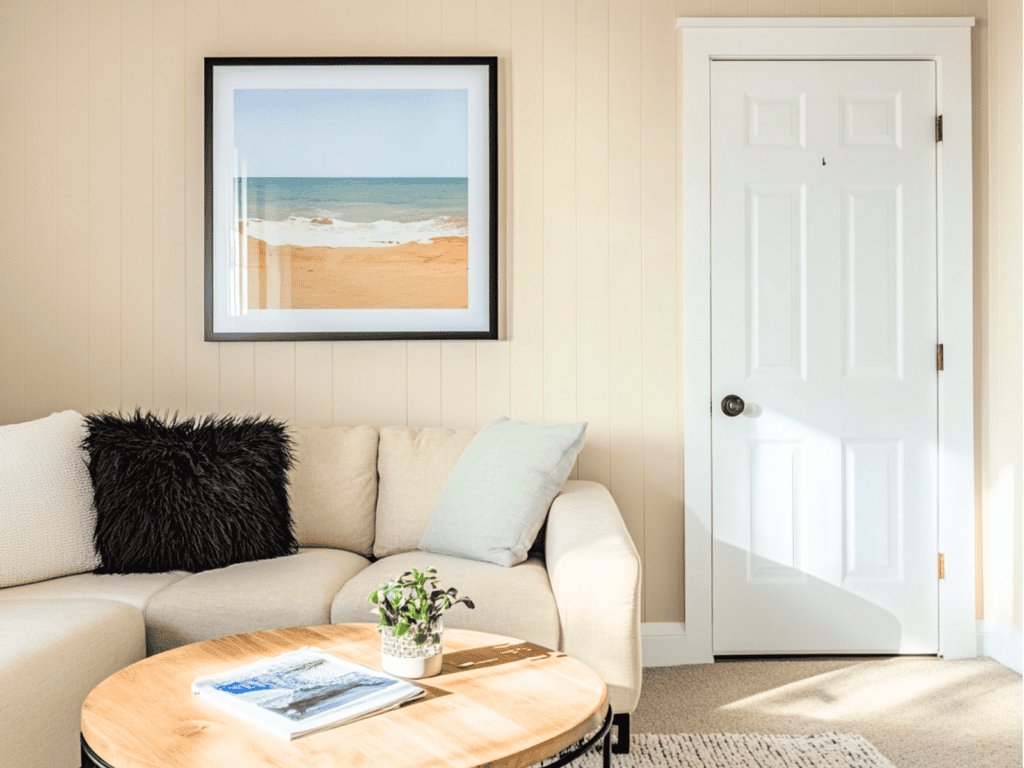
Setting Realistic Expectations
Remember, progress is more important than perfection. Some days will be messier than others, and that’s okay. Focus on the overall trend of improvement rather than daily perfection.
In my journey, I’ve learned to embrace imperfection. I celebrate the progress we’ve made rather than stressing over occasional lapses.
Staying Motivated
Maintaining motivation is key to long-term decluttering success. One strategy is to regularly remind yourself of the benefits you’ve experienced from living in a clutter-free space. Take before and after photos of your home to visually track your progress. Keep a journal noting how your decluttering efforts have improved your daily life, whether it’s easier mornings or more peaceful evenings.
Another motivational strategy is to set new decluttering goals or challenges for yourself. For example, aim to declutter for an extra 5 minutes per day or tackle a particularly challenging area of your home. Continuously setting and achieving small goals keeps the momentum going.
Avoiding Backsliding
It’s important to regularly reassess your systems and routines to avoid falling back into old cluttering habits. Schedule a monthly or quarterly “decluttering review” where you walk through your home and identify any areas that need extra attention. Use this time to tweak your habits or implement new strategies as needed.
Another key to avoiding backsliding is to address the root causes of clutter. If you find yourself frequently purchasing unnecessary items, work on your shopping habits. If sentimental attachments make it hard to let go of things, practice techniques for processing these emotions in a healthy way. By addressing the underlying issues, you make long-term success more likely.
Adapting Habits as Life Changes
As life changes, so should your decluttering routine. Be flexible and willing to adjust your habits to new circumstances.
When we started remodeling our rental home, I had to modify my habits to find time for everything. I took this opportunity to reassess and improve our organizational systems.
Creating a Support System
Having accountability partners or joining decluttering groups can provide motivation and fresh ideas. Share your journey with like-minded individuals.
Starting my home organization and decluttering business reinforced my habits tremendously. Teaching others has helped me stay accountable and continuously improve my own practices.
Conclusion

These 20 daily decluttering habits have the power to transform your home and life. Start small, be consistent, and watch as your space becomes more organized and peaceful. Remember, it’s a journey, not a destination.
As someone who’s experienced the profound impact of these habits, I can attest to their life-changing potential. A clutter-free home has brought me peace, productivity, and joy. I encourage you to embark on this journey and experience these benefits for yourself.
Your Questions Answered
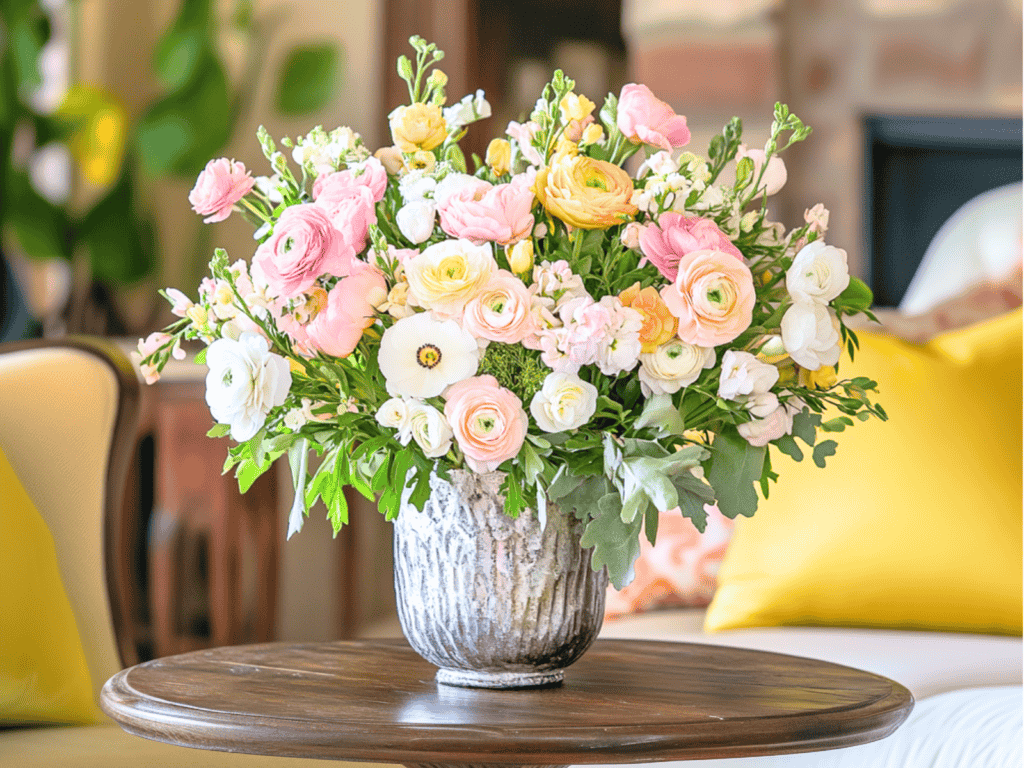
1. How long does it take to form these decluttering habits?
Based on my experience and habit-formation research, forming a new habit typically takes about 21 days. However, this can vary. Be patient and consistent, and you’ll see results.
2. What if I miss a day? Should I double up the next day?
Don’t worry about missed days. Simply resume your habits the next day. Doubling up can feel overwhelming and may lead to burnout. Consistency over time is more important than perfection every day.
3. How can I maintain these habits when I have roommates or a partner who isn’t on board?
Focus on your own spaces first. Lead by example and gently encourage participation. Communicate the benefits you’re experiencing. Consider establishing “clutter-free zones” that everyone agrees to maintain.
4. Are any habits particularly crucial for beginners?
The one-minute rule, making your bed daily, and the nightly 10-minute tidy are great starting points. These simple habits offer quick wins and noticeable results, encouraging you to continue.
5. How do you handle gifts that contribute to clutter?
Express gratitude for the thought behind the gift. If possible, find a use for it or display it temporarily. For items you can’t keep, consider gifting them to someone who would appreciate them more or donating them. Remember, it’s okay to prioritize your space and peace of mind.

